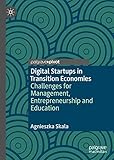Digital startups in transition economies : challenges for management, entrepreneurship and education / Agnieszka Skala.
Material type: TextPublisher: Cham, Switzerland : Palgrave Macmillan, [2019]Description: 1 online resourceContent type:
TextPublisher: Cham, Switzerland : Palgrave Macmillan, [2019]Description: 1 online resourceContent type: - text
- computer
- online resource
- 3030015009
- 9783030015008
- 658.4/038 23
- HD30.2 .S53 2019
| Item type | Current library | Call number | Status | Date due | Barcode | |
|---|---|---|---|---|---|---|
| E-Resources | Main Library E-Resources | 658.4/03 Sk626 (Browse shelf(Opens below)) | Available | E000755 |
Includes bibliographical references and index
Intro; Contents; List of Figures; List of Tables; Introduction; Chapter 1: The Startup as a Result of Innovative Entrepreneurship; 1.1 Entrepreneurship and Innovation; Innovators and Imitators; Innovative Entrepreneurship and Economic Development; Innovation and the Size of the Enterprise; 1.2 Innovative Entrepreneurship in the Digital Revolution Era; 1.3 Startups: Literature Research; 1.4 Startup Definition: A Discussion; 1.5 Spiral Definition of a Startup; 1.6 Chapter Summary; References; Chapter 2: Characteristics of Startups; 2.1 Desk Research: Literature Review. Global Startup Ecosystem 2015 Ranking Money Tree Report; The PwC Report: "The Startup Economy"; European Startup Monitor; Montreal Startup Ecosystem Report; Startup Research Worldwide: A Summary; 2.2 Own Research: "Polish Startups"; Method; The Questionnaire; Sample Selection; Pilot Study; Results of the 2015-2018 Research; 2.3 Own Research: Startups in the Visegrád Group Countries; Conditions for Startups: Macroeconomic Data; Conditions for Startups: Innovation and Business; Comparative Analysis of Startups in the Visegrád Countries; 2.4 The Main Characteristics Differentiating Startups. 2.5 The Characteristics of Startups Using the "Spiral Definition of a Startup" and the Main Differentiating Variables; 2.6 Chapter Summary; References; Chapter 3: Startups as a Challenge for Management and Education; 3.1 Contemporary Challenges for Management; 3.2 The Tradition of Management in Poland; 3.3 Startups as a Challenge for Management; 3.4 Lean Startup as a Proposal for the Methodology of Managing Startup Development; Discussion of Lean Startup as a Methodology for Managing a Startup; 3.5 Management Education; 3.6 Education for Entrepreneurship; 3.7 Education for Startups. Education for Startups: Examples of Author's Own Implementations, Warsaw University of Technology: Innovative Entrepreneurship; Warsaw University of Technology: "Startup Management"; SPIN Innovation Nest Entrepreneurship School: Workshops for Startups; 3.8 Chapter Summary; References; Chapter 4: Conclusions; Index.
Available to OhioLINK libraries
This book responds to the growing demand for a scientific approach to the concept of startups, which are a manifestation of the digital revolution and an innovation-driven economy. With a focus on digital enterprises, the author presents empirical research carried out over 4 years in collaboration with the Startup Poland Foundation, and provides a developed universal definition of a startup. This book highlights the necessity of a clear definition, in order for startups to be treated as a permanent economic phenomenon, rather than a temporary whim. Addressing the crucial need for an effective startup management methodology and more education on this form of entrepreneurship, Digital Startups in Transition Economies offers guidance for those researching entrepreneurship and innovation, as well as entrepreneurs, public institutions, startup accelerators and technology transfer centres.
This book responds to the growing demand for a scientific approach to the concept of startups, which are a manifestation of the digital revolution and an innovation-driven economy. With a focus on digital enterprises, the author presents empirical research carried out over 4 years in collaboration with the Startup Poland Foundation, and provides a developed universal definition of a startup. This book highlights the necessity of a clear definition, in order for startups to be treated as a permanent economic phenomenon, rather than a temporary whim. Addressing the crucial need for an effective startup management methodology and more education on this form of entrepreneurship, Digital Startups in Transition Economies offers guidance for those researching entrepreneurship and innovation, as well as entrepreneurs, public institutions, startup accelerators and technology transfer centres.
There are no comments on this title.

